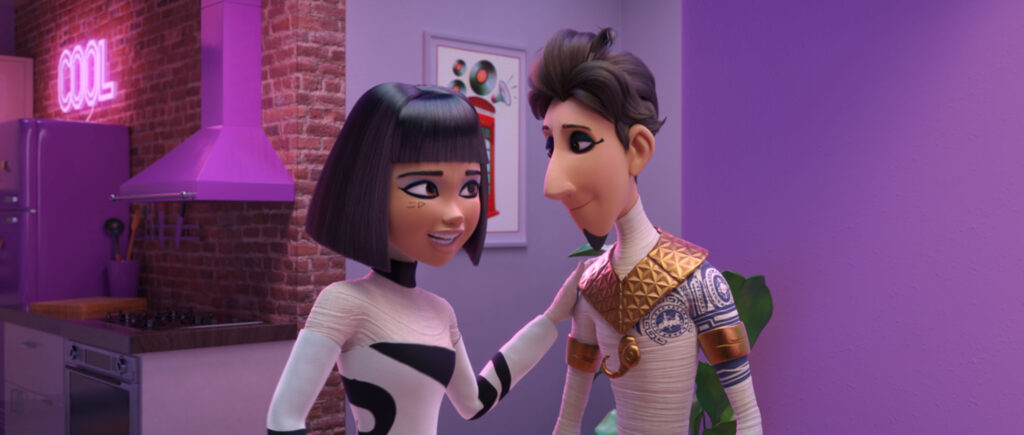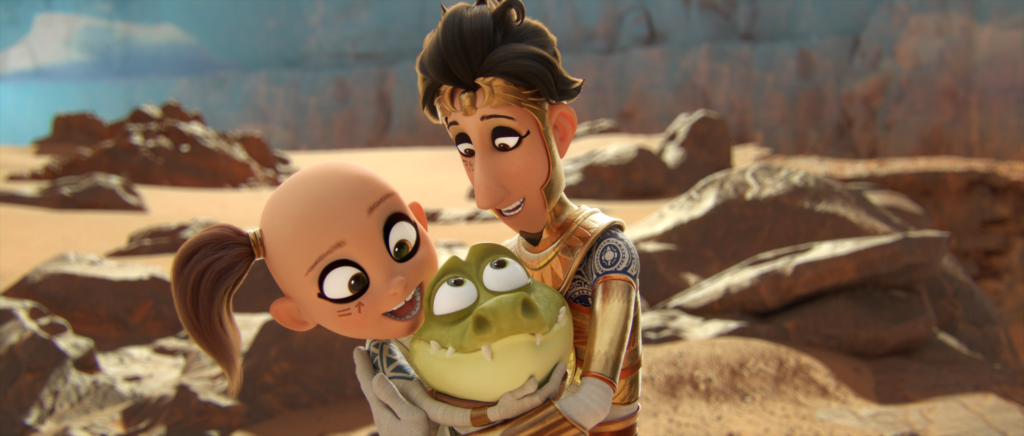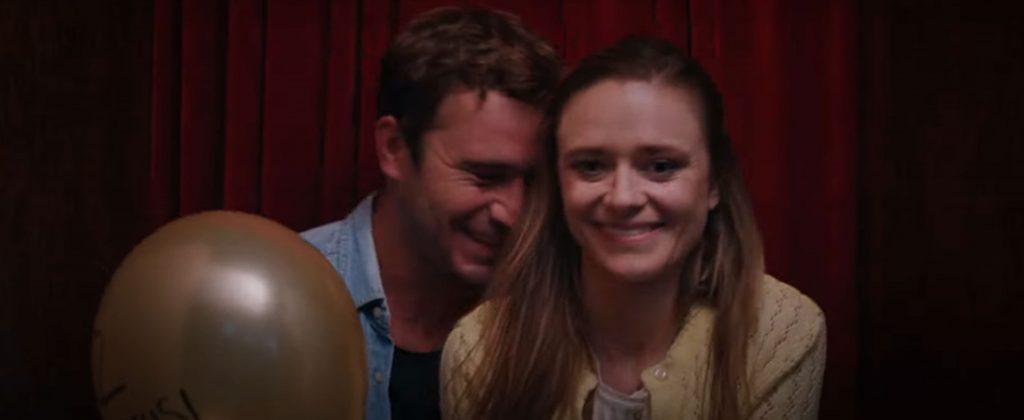March 1, 2023
by Carla Hay

Directed by Juan Jesús García Galocha
Culture Representation: Taking place in London and in an underworld in Egypt, the animated film “Mummies” features a cast of characters that are Egyptian mummies and humans.
Culture Clash: A male mummy and a mummy princess are expected be engaged in an arranged marriage, but they are reluctant to get married to anyone, and their travel from their underworld in Egypt to modern-day London in search of a valuable wedding ring that was stolen from them.
Culture Audience: “Mummies” will appeal primarily to people who are interested in watching any type of fantasy animation, no matter how dull and predictable it is.

“Mummies” could have been a wildly imaginative adventure about the contrasts between ancient Egypt and modern London, but this boring animated film has a clunky narrative, unremarkable visuals and a stale plot. Perhaps some viewers will be satisfied with “Mummies” if they have very low standards or haven’t seen many animated films. However, this movie is so derivative and trite, it seems like a throwaway from the 1980s.
Directed by Juan Jesús García Galocha, “Mummies” has the most basic of basic plots that is really a very lukewarm, watered-down version of a Disney princess movie. Javier Barreira and Jordi Gasull wrote the frequently awkward screenplay, which was originally written as a Spanish-language film, but the movie has an English-language version too. The language difference isn’t the problem, because the dialogue in the movie would be just as witless and dull, no matter what the language.
“Mummies” begins by showing a championship charioteer named Thut (voiced by Joe Thomas) in an ancient Egyptian underworld called the World of Mummies, populated entirely by mummified creatures that are human and non-human. Thut holds the record for winning the most chariot races in the World of Mummies. Thut is in a chariot race and wins, but one of his chariot wheels falls off, and he tumbles out of his chariot. It’s a blow to his confidence, and he never enters a chariot race again.
Publicly, Thut tells people that he retired because he has no more storage space for trophies. Privately, Thut has become afraid of moving at a fast speed because of his chariot accident. As a retired charioteer, Thut occupies his time cashing in on his past glories by signing autographs. He is also the sole guardian of his energetic 8-year-old brother Sekhem (voiced by Santiago Winder), who greatly admires Thut. Sekhem has a baby crocodile as a pet named Croc, who acts like a puppy and is Sekhem’s constant companion.
Meanwhile, a greedy archaeologist named Lord Sylvester Carnaby (voiced by Hugh Bonneville), who is visiting Egypt from London, finds the tomb of an ancient Egyptian named Princess Nefer. To the dismay of Lord Carnaby, the tomb is empty. He has two bumbling sidekicks named Dennys (pronounced Dennis) and Danny (both voiced by Dan Starkey), who are fraternal twins. Viewers of “Mummies” will learn nothing about these two subordinate characters, who are essentially useless and take up space.
Princess Nefer (voiced by Eleanor Tomlinson) is actually alive and well, as an undead mummy living in the World of Mummies. In this movie, mummies do not want to interact with living human beings. The filmmakers’ world building in “Mummies” is so poorly constructed and vaguely explained, when certain mummy characters inevitably cross over into the living world, this transition just looks very tossed-off and underwhelming.
Thut and Nefer meet by chance one day on the street in the World of Mummies. Nefer and Thut trade sarcastic commentary and don’t seem to like each other very much. It’s at this point you know that they will eventually be each other’s love interest. However, Thut and Nefer tell everyone they know that they are not ready to get married to anyone. Thut says he wants to permanently remain a bachelor. Nefer, who is an only child, tells her father Pharaoh (voiced by Sean Bean): “I need at least 100 more years before I get engaged.”
Nefer loves to sing, but her old-fashioned mother (voiced by Celia Imrie) scolds Nefer for singing out loud. She tells Nefer that singing is inappropriate for royalty and should only be done by entertainers. (Karina Pasian is the singing voice of Nefer.) The only thing that Nefer’s parents want for Nefer is for her to get married, so that she can produce and heir to continue the family legacy.
In this World of Mummies, a royal family heirloom is a magical trinket in the shape of phoenix, which was given by the goddess of love. Through an ancient ritual, the phoenix comes to life and is supposed fly to the person who will become the spouse of any unmarried heir to the throne. Nefer’s family does the ritual, and the phoenix (which looks like a burning flame) flies near Thut’s home and is accidently hit with a rock by Sekhem.
When Nefer and Thut find out that the phoenix has “chosen” them to get married, they both resist the idea. Thut is told that he has to safeguard the wedding ring anyway. Through a series of events, the ring is stolen by Lord Carnaby, who brings it to London to sell and put on display in a prominent museum. Thut, Sekhem, Croc and Nefer then go to London to retrieve the ring and experience culture shock at all the modern technology.
In between the mindless dialogue and terribly staged action sequences, “Mummies” has a few musical scenes where Nefer sings, including a silly sequence where she ends up performing in a West End musical that just happens to be about Egyptian mummies. There’s nothing wrong with the singing or any of the cast members’ voice work, but the movie’s original songs and musical scenes are very bland and forgettable. You know that “Mummies” is creatively lacking in innovation when it has to over-rely on the Bangles’ 1986 hit “Walk Like An Egyptian” for its biggest musical moments.
Adding to the movie’s substandard quality, “Mummies” has a character named Ed (voiced by Shakka), who is a London-based aspiring pop music producer/composer. Ed is illustrated as someone of South Asian heritage, but the “Mummies” filmmakers made him a very corny and cringeworthy subservient stereotype. Predictably, Ed (who first saw Nefer perform in the West End musical) says that he can make Nefer a music star. And there’s some nonsense in the movie about Nessa (with Ed’s help) making a music video that becomes a viral sensation.
Everything about “Mummies” could have been pre-programmed on a computer with a data dump of outdated princess movies where the main goal is for the princess to get married and “live happily ever after.” The World of Mummies is supposed to have characters who live by ancient traditions in Egypt, so no one is expecting this movie to be about progressive feminism. But even depictions of Cleopatra in movies give her some autonomy, while Nefer has no autonomy. Even though Nefer pretends to have a mind of her own, she ultimately follows whatever the male characters tell her to do.
And you already know how this movie is going to end, which isn’t necessarily a bad thing if the journey along the way is entertaining to watch. In that regard, “Mummies” falls very short. “Mummies” has a few “cutesy” moments, but the overall movie is just so lazy for not bothering to have a truly innovative story and interesting characters. The entire movie is lacking in personality, just like a mummified corpse in a coffin.
Warner Bros. Pictures released “Mummies” in U.S. cinemas and in Spain on February 24, 2023.


